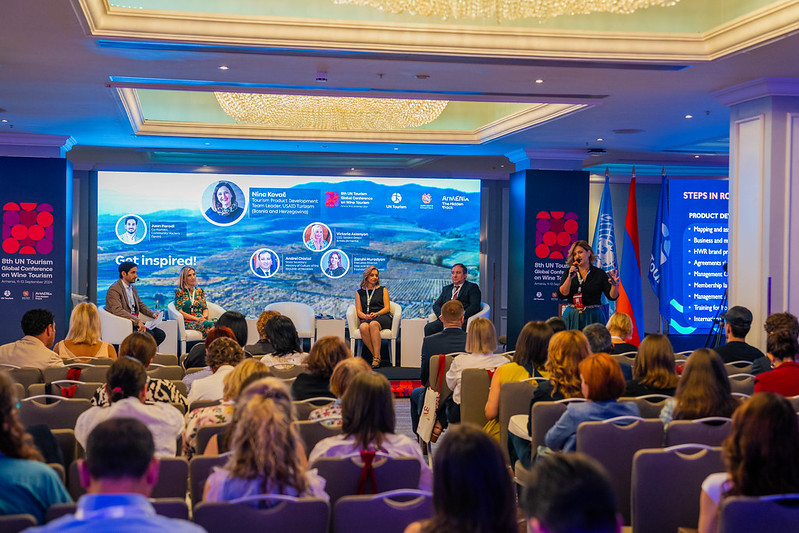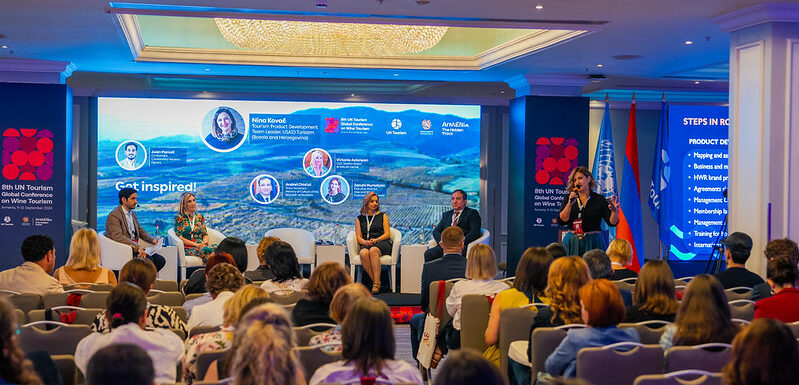On September 12-13, 2024, Armenia proudly hosted the 8th Global Wine Tourism Conference, organized by the United Nations.
This prestigious event offered an extraordinary platform for analyzing global trends in wine tourism and identifying key challenges for the future. With over 300 participants from more than 25 countries, the conference provided a valuable space for professionals, experts, and innovators to discuss strategies for the future of wine tourism and promote sustainable growth in the industry.The conference opened with remarks from Zurab Pololikashvili, Secretary-General of UN Tourism, who highlighted the crucial role of wine tourism in preserving the culture and history of wine-growing regions. “The Global Wine Tourism Conference is a unique opportunity to share stories, traditions, and rituals associated with winemaking,” Pololikashvili stated. “These stories are not just about wine, but about people, lands, and the cultures that have nurtured these traditions for generations. It’s essential to integrate these heritages into the wine tourism experience.”
Armenia, with its ancient winemaking traditions and rich cultural heritage, provided the perfect backdrop for this year’s theme: “Heritage in Every Bottle: Crafting Authentic Wine Tourism Experiences.” The discussions emphasized the importance of creating wine tourism experiences that go beyond winery visits, incorporating the cultural, historical, and environmental identities of the region.
Several key themes emerged during the conference, including the need to enhance the professional skills of those working in the wine tourism industry. The shortage of qualified personnel, from wine guides to product managers, was identified as a significant barrier to the growth of the sector. Sandra Carvão, Director of the Market Intelligence and Competitiveness department at UN Tourism, stressed the urgent need for specialized training programs to address these gaps.
Digitalization was another major focus. Despite technological advances, many wine tourism destinations are not fully leveraging digital tools to enhance visitor experiences and promote their offerings. Liz Palmer, a keynote speaker and Canadian wine journalist, highlighted the importance of building a strong digital brand to attract future travelers. Palmer outlined ten integrated strategies, including clear brand identity, content marketing, and social media engagement, to ensure wine tourism brands remain resilient and competitive.
Community involvement was also a central topic. As Andrei Chistol, Secretary of State for Culture of Moldova, shared, engaging local communities is vital for creating authentic and sustainable tourism experiences. Chistol also discussed Moldova’s experience in overcoming negative perceptions due to the war in neighboring Ukraine, underscoring the importance of flexible communication strategies that can adapt to crises while remaining true to the values of the region.
One of the conference’s most interesting conclusions was the untapped potential of lesser-known wine destinations. The desire to discover “secret” places has become a powerful marketing tool, posing an additional challenge for established wine destinations that are already competing to differentiate themselves. Paul Wagner, a U.S. wine marketing expert, emphasized that personalization and authenticity are key to attracting tourists. He even suggested that hospitality professionals could benefit from theater courses to develop unique and effective communication strategies.
The role of wine festivals in developing regional brands was also discussed. Experts agreed that many wine festivals suffer from homogenization, often reduced to local fairs with unprofessional wine tasting and generic street food. Instead, festivals should become identity-driven events, offering a deeper connection to the region’s history, art, and cultural attractions alongside the wine. A well-organized festival can increase a region’s visibility during specific times of the year, providing an added incentive for visitors.
Focusing on the next generation, one workshop led by David Mora of the Basque Culinary Institute explored how destinations can adapt to the needs of Generation Z, who prefer personalized, visually appealing, and shareable experiences. Another workshop discussed the idea of creating a Wine Road 4.0, integrating technology, sustainability, and culture. Smart apps offering GPS navigation and real-time information on wineries, as well as augmented reality to enhance the on-site experience, were among the proposed innovations.
In her closing remarks, Sandra Carvão provided a comprehensive overview of the challenges and opportunities ahead for the wine tourism sector. While the industry is growing and evolving, she highlighted the lack of a unified strategic vision at regional and national levels as a major obstacle to sustainable and competitive development in the long term.
Wine tourism can no longer rely solely on wine production or the fame of a label. Destinations must offer an integrated experience that responds to the new demands of tourists, who are increasingly seeking authenticity, deep connections to the land, and emotional storytelling.
The 8th Global Wine Tourism Conference demonstrated that wine tourism is a powerful tool for economic and cultural development, but only if supported by a shared strategic vision. Successful wine tourism experiences must intertwine various aspects of the territory, from history and art to gastronomy and local culture, creating immersive and educational experiences for visitors. Digitalization and sustainability must also play key roles in shaping the future of the sector.
The road to the future lies in collaboration. Wine tourism destinations must embrace innovation and professionalism, moving beyond isolated local initiatives to create sustainable and attractive ecosystems that stand out on the global stage. Only by embracing a holistic and innovative approach can the wine tourism sector unlock its full potential, ensuring a vibrant future for wine regions around the world.

